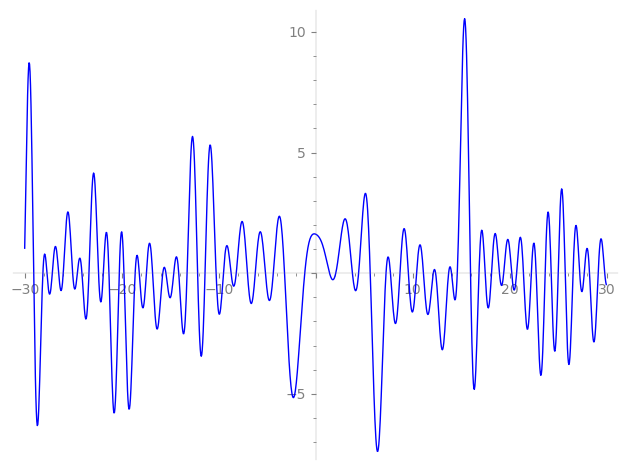| L(s) = 1 | + (−0.288 + 1.38i)2-s + (0.450 + 0.780i)3-s + (−1.83 − 0.798i)4-s + (−1.21 + 0.398i)6-s + (2.29 + 1.30i)7-s + (1.63 − 2.30i)8-s + (1.09 − 1.89i)9-s + (3.24 − 1.87i)11-s + (−0.202 − 1.79i)12-s − 2.41i·13-s + (−2.47 + 2.80i)14-s + (2.72 + 2.92i)16-s + (0.505 − 0.291i)17-s + (2.30 + 2.06i)18-s + (3.07 − 5.33i)19-s + ⋯ |
| L(s) = 1 | + (−0.204 + 0.978i)2-s + (0.260 + 0.450i)3-s + (−0.916 − 0.399i)4-s + (−0.494 + 0.162i)6-s + (0.869 + 0.494i)7-s + (0.578 − 0.815i)8-s + (0.364 − 0.631i)9-s + (0.977 − 0.564i)11-s + (−0.0585 − 0.517i)12-s − 0.671i·13-s + (−0.661 + 0.750i)14-s + (0.680 + 0.732i)16-s + (0.122 − 0.0707i)17-s + (0.543 + 0.485i)18-s + (0.706 − 1.22i)19-s + ⋯ |
Λ(s)=(=(700s/2ΓC(s)L(s)(0.506−0.862i)Λ(2−s)
Λ(s)=(=(700s/2ΓC(s+1/2)L(s)(0.506−0.862i)Λ(1−s)
| Degree: |
2 |
| Conductor: |
700
= 22⋅52⋅7
|
| Sign: |
0.506−0.862i
|
| Analytic conductor: |
5.58952 |
| Root analytic conductor: |
2.36421 |
| Motivic weight: |
1 |
| Rational: |
no |
| Arithmetic: |
yes |
| Character: |
χ700(551,⋅)
|
| Primitive: |
yes
|
| Self-dual: |
no
|
| Analytic rank: |
0
|
| Selberg data: |
(2, 700, ( :1/2), 0.506−0.862i)
|
Particular Values
| L(1) |
≈ |
1.40383+0.803268i |
| L(21) |
≈ |
1.40383+0.803268i |
| L(23) |
|
not available |
| L(1) |
|
not available |
L(s)=p∏Fp(p−s)−1 | p | Fp(T) |
|---|
| bad | 2 | 1+(0.288−1.38i)T |
| 5 | 1 |
| 7 | 1+(−2.29−1.30i)T |
| good | 3 | 1+(−0.450−0.780i)T+(−1.5+2.59i)T2 |
| 11 | 1+(−3.24+1.87i)T+(5.5−9.52i)T2 |
| 13 | 1+2.41iT−13T2 |
| 17 | 1+(−0.505+0.291i)T+(8.5−14.7i)T2 |
| 19 | 1+(−3.07+5.33i)T+(−9.5−16.4i)T2 |
| 23 | 1+(3.73+2.15i)T+(11.5+19.9i)T2 |
| 29 | 1+0.435T+29T2 |
| 31 | 1+(−1.26−2.19i)T+(−15.5+26.8i)T2 |
| 37 | 1+(5.65−9.78i)T+(−18.5−32.0i)T2 |
| 41 | 1−7.35iT−41T2 |
| 43 | 1−5.80iT−43T2 |
| 47 | 1+(−5.78+10.0i)T+(−23.5−40.7i)T2 |
| 53 | 1+(1.55+2.69i)T+(−26.5+45.8i)T2 |
| 59 | 1+(−1.73−3.00i)T+(−29.5+51.0i)T2 |
| 61 | 1+(8.99+5.19i)T+(30.5+52.8i)T2 |
| 67 | 1+(−8.52+4.92i)T+(33.5−58.0i)T2 |
| 71 | 1−9.96iT−71T2 |
| 73 | 1+(8.48−4.89i)T+(36.5−63.2i)T2 |
| 79 | 1+(−0.397−0.229i)T+(39.5+68.4i)T2 |
| 83 | 1+2.59T+83T2 |
| 89 | 1+(8.55+4.94i)T+(44.5+77.0i)T2 |
| 97 | 1+4.54iT−97T2 |
| show more | |
| show less | |
L(s)=p∏ j=1∏2(1−αj,pp−s)−1
Imaginary part of the first few zeros on the critical line
−10.26868032315461018657650697784, −9.517320483380932721221831261726, −8.724924930497671790525700281345, −8.193359014806216574932042231883, −7.03984878064138429624432859154, −6.23258650267539193696138988422, −5.18473240947939256646899729109, −4.37439883188040736035252330151, −3.21440342933127530425380718191, −1.13199219369193030973908726704,
1.42747652266068465734193393270, 2.06334771878622122453001655337, 3.78140005486574857981845541544, 4.41969111333366381119231629663, 5.61994972933546055765557827627, 7.24505093422419116895140097668, 7.70458216584139071539264597139, 8.685078148088543470546396724485, 9.552315658691274286267401492955, 10.39295363427268366571405206908

